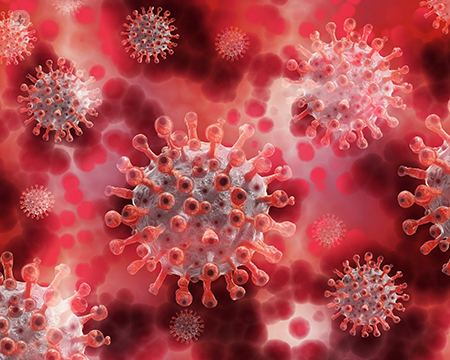How to overcome and avoid addiction in the COVID-19 pandemic
Escrito por:It was easier to avoid addictive habits and substances before the coronavirus COVID-19 pandemic. For most of us, the pandemic has resulted in a huge change of structure in our daily lives.
As a result, the number of people suffering from addiction is rising. Dr Richard Bowskill explains the risk factors for this as well as how to identify and help someone developing an addiction or facing relapse. He also clarifies the importance of seeking treatment and support.

Who is at risk of developing an addiction?
Anyone who has undergone an event that greatly changes their personal life, work life or social life is at risk of developing an addiction or relapsing . The pandemic and all the associated social changes have tipped many people over into a full-blown addiction, resulting in a physical and psychological dependency.
For example, people who drink fairly large amounts of alcohol in a harmful way are at risk of alcoholism. I’ve seen quite a lot of patients who have been drinking heavily, even since before the coronavirus COVID-19 pandemic began. The difference is that before the pandemic, they could keep on top of their intake. People can be in a phase of heavy drinking that is not quite yet an addiction for a long time. In fact, it can be several years until they dip into full addiction.
How can the pandemic lead to addiction?
Changes in structure
A major part of increasing addition during the pandemic has proven to be a change in structure to people’s lives. Since the start of the pandemic, I’ve seen quite a few patients go from heavy drinking to full-blown dependency.
For example, someone might have been drinking wine at night for several years but managing to function without it during the day because they were at work. However, without their previous structure of leaving home and going to the workplace, there is the temptation to start drinking wine earlier in the day. This allows the addiction to take hold.
Changes in mental health
The pandemic is causing widespread general mental health problems of:
- Lost income
- People fearing for jobs and/or their partner’s job
- Not having contact with family members in terms
- Family members being in care homes
- People dying
Lockdowns and shielding have impacted people’s social contact, resulting in loneliness, anxiety and depression. People developing addiction tend to use alcohol and substances to soothe themselves. If someone uses alcohol to deal with negative situations (e.g. stress, anxiety and sleep-disturbance), they are more prone to self-medicating. This can turn into a vicious circle.
Changes in how we can grieve
We’re being asked to behave in a very inhumane way in the pandemic. Many people have elderly relatives that they cannot see with conditions such as dementia, while others have relatives who are dying in care homes from the virus or other illnesses. It’s damaging to the relatives if they lose someone very important (e.g. their father, mother, other relatives or a friend) and cannot be there when they die. In situations like this, people can think that alcohol or other substances will help them cope with grief.
A lack of support for new students
Younger people who have transitioned into university or who are transitioning from university to the start of their careers are exposed to particularly confusing pressures related to pandemic. These are already vulnerable times with big transitions (e.g. some may be leaving home for the first time).
University is now a different experience with a lack of:
- Social structure
- Contact-time for lectures and tutorials
- The emotional support usually have offered to them
If a young person is vulnerable to addiction and gets access to one or more of a variety of substances (e.g. cannabis, MDMA, cocaine), addiction can take hold very quickly.
What stressors increase the possibility of relapse?
Pandemic-related stressors that could cause a relapse are similar to those of the early phases of addiction: a lack of structure, a lack of social contact, fear of job losses and worries about catching the virus and becoming ill.
A lot of people have been free from alcohol or a substance addiction for years. They often maintain that sobriety is achieved by using routines and applying structure to their lives.
Some people go to AA (Alcoholics Anonymous) meetings regularly, even once a week or once a day. Groups like this and others such as UKNA (UK Narcotics Anonymous) are a place to share difficulties and provide mutual support. These meetings have been moved online to video services like Zoom, it this can decrease the human interaction and support felt.
How can friends and family recognise the signs of relapse?
Watch out for common signs:
- Get the person to acknowledge that they are struggling.
- Talk about the impact it’s having on them.
- Provide structure where possible.
How can someone provide structure while in lockdown?
If you or someone you know needs structure, consider if the following might be useful for you:
- Take the dog out for a walk, if you have one.
- Go to the local shop (following current guidelines on travel to shops).
- See people within your bubble (if bubbles are currently allowed).
- Keep in touch with friends - many people find video calls very helpful.
- Consider treatment, even if it’s online. Some therapists are seeing individuals face-to-face and some aren’t. Try to get in touch with them for anxiety and depression.
Are you available for consultations?
During the pandemic, I’m seeing people both face-to-face and via e-Consultation (consultation via video call). Hospitals are trying to reduce face-to-face appointments where possible due to the virus, so e-Consultation is still preferred.
Younger people are often fine with online appointments and older people are often not used to it. Sometimes, people with social anxiety and those on the autistic spectrum can find it very hard to deal with video remote connections. So, in some cases, we will be able to have face-to-face appointments.
How can people access treatment and get support during these times?
People should feel empowered to seek help for mental health problems. It’s as important to detect mental issues as it is to detect physical issues. Make contact with your GP or seek professional help. There has been a shift to more mental health professionals accepting self-referrals because of the difficulties in accessing GP appointments.
You can book a face-to-face or video consultation with Dr Bowskill by clicking here.


